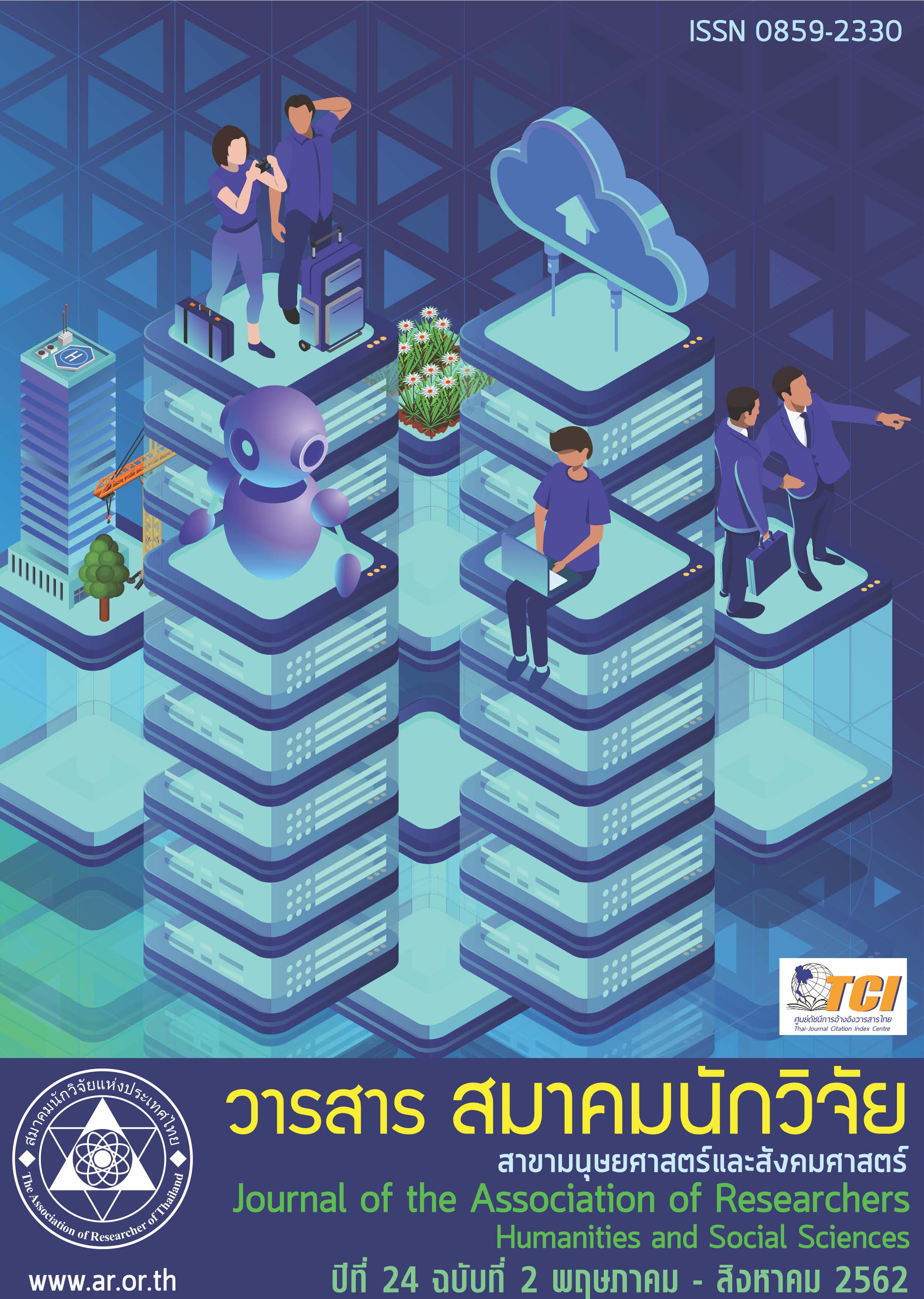Potential of Community Based Tourism Management in Trat Province
Main Article Content
Abstract
The objectives of this research were 1. to investigate community people’s knowledge towards Community Based Tourism (CBT) management, and 2. to assess potentials of leaders and management staffs on CBT management. Areas of study were 29 CBT communities in Trat province. Respondents divided into two groups: 1. people in CBT communities total amount of 139 who answered CBT management knowledge test. Data revealed from the test were analyzed by using percentages, 2. CBT leaders and management staffs total amount of 120 who mutually assessed CBT potential by using predetermined 11-part criteria and rated questionnaires on behalf of 29 communities as well as public hearing process. Data collected were analyzed by means and standard deviation. Results revealed that majority of community members have CBT management knowledge except the ‘CBT direction setting’ issue which 58.2 percent of respondents misunderstood that the CBT direction setting may not identify by community. Potential of CBT communities in Trat province ranked at ‘good level’ were their human capital including potential of community people (mean = 4.27, S.D. = 0.69), potential of leaders (mean = 3.63, S.D. = 0.75), cooperation for CBT development (mean = 3.64, S.D. = 0.92). After classification of each community potential revealed that, 1. there were three communities with excellent managerial capability (Grade A), 2. six communities marked as quite excellent (Grade B+), and 3) five communities were at good level (Grade B). The study suggested some CBT development guildelines such as improving weak points of management system by suing existing strong human capital through inter-community knowledge sharing among higher and lower potential communities. These will lead to upcoming better changes of all 29 communities.
Article Details
บทความที่ปรากฏในวารสารนี้ เป็นความรับผิดชอบของผู้เขียน ซึ่งสมาคมนักวิจัยไม่จำเป็นต้องเห็นด้วยเสมอไป การนำเสนอผลงานวิจัยและบทความในวารสารนี้ไปเผยแพร่สามารถกระทำได้ โดยระบุแหล่งอ้างอิงจาก "วารสารสมาคมนักวิจัย"
References
นงลักษณ์ ประสพสุขโชคชัย และบุญดี บุญญากิจ. (2548). การจัดการความรู้ จากทฤษฎีสู่การปฏิบัติ. กรุงเทพฯ: สถาบัน เพิ่มผลผลิตแห่งชาติ
พจนา สวนศรี. (2546). คู่มือการจัดการท่องเที่ยวโดยชุมชน. กรุงเทพฯ: โครงการท่องเที่ยวเพื่อชีวิต และธรรมชาติ
พิมพ์ระวี โรจน์รุ่งสัตย์. (2553). การท่องเที่ยวชุมชน. กรุงเทพฯ: โอเดียนสโตร์.
ยุทธนา แซ่เตียว . 2547. การวัด การวิเคราะห์ และการจัดการความรู้: สร้างองค์กรอัจฉริยะ. กรุงเทพฯ: อินโนกราฟฟิกส์.
วีระพล ทองมา และประเจต อำนาจ. (2547). ผลที่เกิดขึ้นจากการจัดกิจกรรมการท่องเที่ยวต่อประชาชนในตำบลแม่แรม อำเภอแม่ริม จังหวัดเชียงใหม่. กรุงเทพฯ: สำนักงานคณะกรรมการวิจัยแห่งชาติ.
วุฒิชาติ สุนทรสมัย และปิยะพร ธรรมชาติ. (2559). รูปแบบการท่องเที่ยวชุมชนเชิงสุขภาพของจังหวัดปราจีนบุรีเพื่อการ พัฒนาเครือข่ายวิสาหกิจชุมชนอย่างยั่งยืน.วารสารสมาคมนักวิจัย, 21(3), 167-181.
อุบลวรรณ ประดับสุข. (2549). การเรียนรู้และประสบการณ์เรื่องการท่องเที่ยวโดยชุมชนจาก สกว. [จุลสาร]. กรุงเทพฯ: การท่องเที่ยวแห่งประเทศไทย.
Davenport, T. H. (1999). Knowledge Management. Bangkok: A.R. Business Press
Fennell, D. A. (1999). Ecotourism: An Introduction. New York: Routledge.
Karacaoglu, S. and Birdir, K. (2017). Success Factors of Community Based Tourism (CBT) Perceived by Local Prople: The Case of Misia Project. International Rural Tourism and Development Journal, 1(2), 53-61.
Translated Thai Reference
Pradabsuk Ubonwan. (2006). Learning and Experiences towards Community Based Tourism from the TRF [Pamphlet]. Bangkok: Tourism Authority of Thailand.
Prasopsukchokchai Nongluk and Boonyakij Boondee. (2005). Knowledge Management: from theory to practice. Bangkok: Thailand Productivity Institute.
Rojrungsat Pimrawee. (2010). Community Tourism. Bangkok: Odeon Store.
Sae-Tieow Yuttana. (2004). Measurement Analysis, and Knowledge Management: Creating Intelligent Organizations. Bangkok: Innographics Publishing.
Soonthonsmai Wutthichart and Thammachart, Piyaporn. (2016). Community-Based Healthy Tourism Patterns for Sustainable Development of Community-Based Enterprise Networking in Prajinburi Province. Journal of the Association of Researchers, 21(3), 167-181.
Suansri Pojjana. (2003). Community Based Tourism Handbook. Bangkok: Tourism for Life and Nature Project.
Thongma Weerapon and Amnat, Prajate. (2004). Effects of Community Based Tourism Activities on People in Mae Ram Sub-district, Mae Rim District, Chiang Mai Province. Bangkok: National Research Council of Thailand.
Trat Provincial Office of Tourism and Sports. (2017). Tourists Statistics of Trat Province. Retrieved from http://www.mots.go.th/province_new/ewt/trat/ewt_news.php?nid=76


